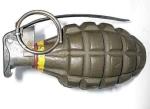 In the spirit of the month of Ellul, a time for reviewing our actions as the Days of Awe approach, I offer this discussion of subconscious emotional triggers, something which affects us all to some extent, based on an excellent article by family therapist Sarah Channah Radcliffe.
In the spirit of the month of Ellul, a time for reviewing our actions as the Days of Awe approach, I offer this discussion of subconscious emotional triggers, something which affects us all to some extent, based on an excellent article by family therapist Sarah Channah Radcliffe.
If you’ve ever found yourself saying something like:
“When he made that facial expression it really got my back up”
“Something about the situation just made me flare up”
“Her choice of words hit a raw nerve”
and especially if you find the same situation repeatedly causes the same reaction, and even more especially if you are aware that your reaction is excessive relative to the “crime”, you may well be experiencing a “trigger reaction”.
The emotional trigger may be a purposefully hurtful comment or action, or a totally innocent one, that provokes an intense, seemingly irrational reaction.
Consider a man who is triggered by the sight of dirty dishes in the kitchen at night. His wife understands his sensitivity, knowing his parents to be either compulsively clean, or extremely disorganised. Although she herself doesn’t mind a few unwashed plates on the kitchen counters, in a healthy relationship she might take care to educate the children to clear up after themselves immediately, keeping the counters clean, to avoid her husband’s trigger. He, on the other hand, being aware that he has a tendency to overreact to an untidy kitchen, takes special care not to.
This kind of mutual respect works well when each person has just a few identifiable triggers.
However, a spouse who has too many triggers has an emotional problem that requires treatment. No-one should have to walk on eggshells in their own home, or workplace, to avoid triggering a relative, workmate or friend.
Identifying one’s triggers
Even if one has just one or two triggers, it’s important to be aware of them, and keep them under control, rather than rely on the avoidance strategies of others.
A child speaking rudely to an adult within the family, in the classroom, or any other situation, does not justify shouting back at the child. Instead we need to try to identify what causes us to loose control, and regain it.
When we go into rant, rage and meltdown mode, we can be pretty sure we are dealing with an emotional trigger. The theatricals are the unrestrained rage of a helpless child. Now, in adulthood, we need to appreciate that we have more resources to deal with difficulties at home, at work, or in the community. If we can’t, we should at least be able to acknowledge that we have been triggered emotionally, and remove ourselves from the situation until our higher faculties return.
The challenge of parenting
Parenting triggers adults enormously. Whenever we feel like shouting at a child – whether we act on it or not – we can be sure we have been triggered. Otherwise why wouldn’t we provide the calm reaction we know would be more productive? The Torah abhors anger – most authorities allow it only in the most extreme and unusual circumstances – or forbid it altogether, allowing only a semblance of anger, but not the actual loss of our self-control.
One parent described a trigger reaction like this:
I found myself unable to do homework with my seven-year-old. His mind would wander and he’d fool around. I felt like pushing his head into the text book. Examining my feelings I realised this was exactly what my father did to me. Once I realised that the rage wasn’t mine I found it easier to control, and am now consciously working on better parenting.
Questions to ask ourselves that can help point to the source of the trouble might be:
Why is a nice person like me behaving so monstrously?
Where did I learn this from?
How old do I look, sound and feel?
The answers can help point to the source of the trouble, and help us correct our behaviour.
Triggers often send us back to our own experiences with parents and teachers, or to long-standing feelings of fear, inadequacy and helplessness. Making the connection, and then reminding ourselves that we are now grown-up, safe, competent, educated and intelligent, can help disarm a trigger once and for all.
Based on an article by Sarah Chana Radcliffe M. Ed., C. Psych. Assoc. in Family First (Mishpacha), 1 May 2003.

